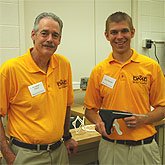New Medical Devices Center opens

June 25, 2008
A new, state-of-the-art laboratory suite at the University of Minnesota opened its doors on June 24, offering the public a glimpse at the future of medical device innovation.
The Medical Devices Center, housed in Shepherd Labs on the East Bank of the Twin Cities campus in Minneapolis, was built specifically for designing, prototyping, and testing new medical devices. The lab features high-tech equipment that allows researchers to view live surgeries in 3D, a computer-aided design precision-instruments area, and mechanical and electronics fabrication centers.
During a tour of the center, student and faculty researchers demonstrated the new equipment, highlighted past successes in developing medical devices at the U, and explained how the new facility will enhance their work in the future.
Overall, the center will provide resources and assistance to researchers and industry partners in the medical device design process from concept through clinical trials. "This center fills a void," says Art Erdman, the center's director and a long-time mechanical engineering professor and medical device design expert. "It directly fills the void of going from idea to advanced prototype that wasn't there before."
"[The center] directly fills the void of going from idea to advanced prototype that wasn't there before," says Erdman.
The center will work to develop new relationships with the vibrant Twin Cities medical device industry and various government agencies in an effort to improve health care worldwide. The Medical Devices Center was named as one of the U's top strategic investments in its 2007 budget request to the Minnesota Legislature.
The center will also educate and help develop the next generation of medical device inventors. Already, the U has provided seed funding for 16 projects--where graduate students are working with an adviser both from IT and the Academic Health Center.
And beginning this fall, the new Medical Devices Center Fellows Program, headed by Marie Johnson, will bring together post-graduate engineering researchers, seasoned medical device professionals, and physicians to identify, create, and test medical devices. This will be an intensive one-year product development experience for the fellows.
According to Erdman, it can be easy for engineers to shut the doors of their labs "and develop useless things," and difficult to connect the needs of the medical industry with the expertise of researchers.
